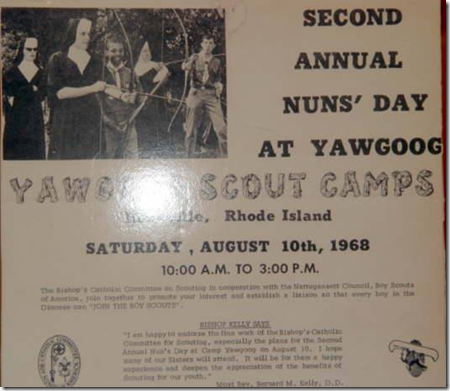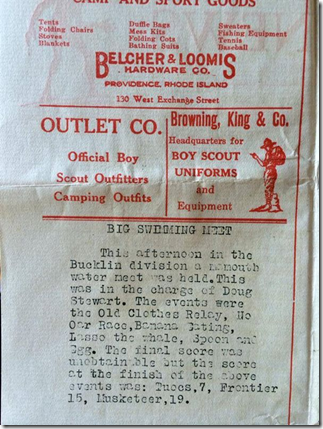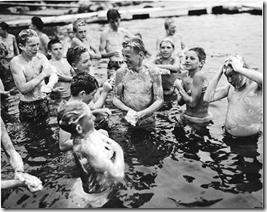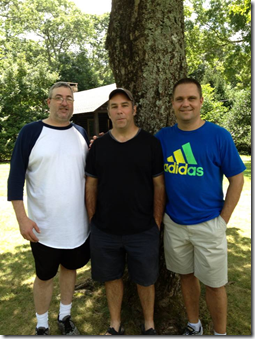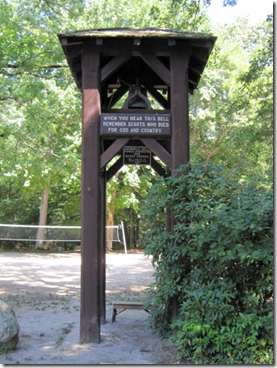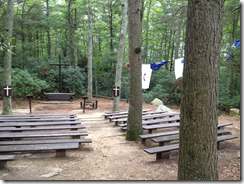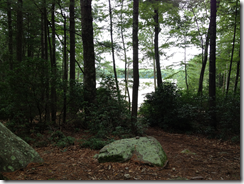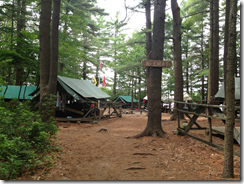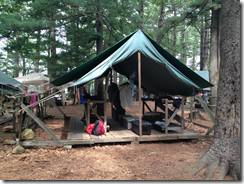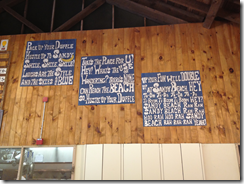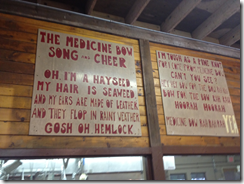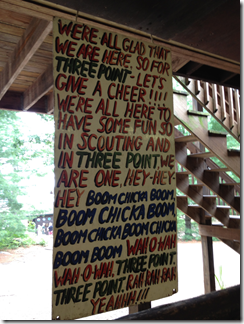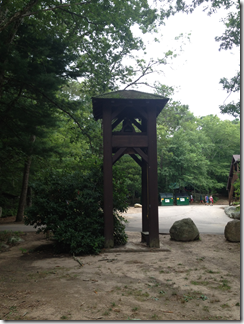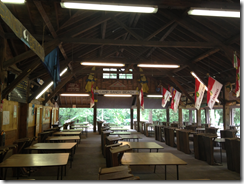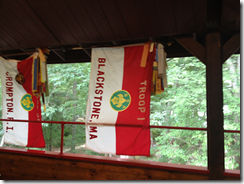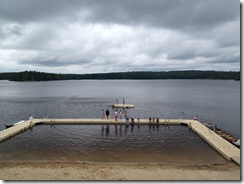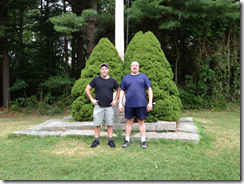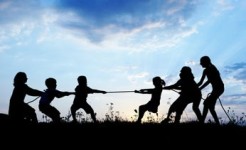When I was a boy, I spent much of my summer at a Camp Yawgoog, a Boy Scout camp in Rockville, Rhode Island. My troop would spend a week at camp, and then I would spend another 2-7 weeks at a campsite designed for boys who wanted to spend more than just one week away from home. It was called Camp Baden Powell, and it consisted of a mishmash of boys from various Boy Scout troops around the country and abroad who were overseen by a theoretical Scoutmaster but were essentially on their own unless they got into trouble.
These were some of the best days of my life. The freedom, the independence, the personal responsibility and the decision-making that I was afforded helped to make the me the person I am today.
It was also fun as hell.
Parents were invited to visit the camp on Sundays, but this was an opportunity that my parents never exercised. I was also required to send a postcard home every Wednesday. If I did not arrive at the dining hall with one in hand, I would not be served dinner.
I often opted to eat a candy bar for dinner or stockpile bread at lunchtime rather than take the time to pen a missive to my parents. For my time at Camp Yawgoog, I was blissfully disconnected from the rest of the world.
As a parent, I will probably send my children to summer camp someday. Ideally, my son will find his way to Camp Yawgoog like his father did, and if I had my way, my daughter would as well. While my children are away at camp, I know that I will miss them a great deal, and I may even find myself nervous about the prospect of turning them over to the care of people who I don’t know all that well.
But as a parent, this is part of my job. I want my children to experience the same level of independence and personal responsibility that I did while away at camp, even if this means cutting the cord for weeks at a time.
It is not supposed to be easy. It may be hard on my children (for about four seconds), and it will most assuredly be difficult for me and my wife. Heart wrenching and frightening, even. Of this I have little doubt.
I have seen it many times before.
For the past several years, I have taken my fifth grade students on an overnight trip to a nearby YMCA camp. For some students, this is the first time that they have ever slept away from home for any reason. Over the years, I’ve had to work hard in order to convince some parents to place their child in my care for those three days. Though I was always sympathetic to their needs and feelings, I never truly understood how difficult it was for some of these mothers and fathers until I became a parent myself.
A few years ago I had a student whose four older brothers and sisters had never spent a night outside the family home until after graduating from high school. As you might imagine, the idea of sending their youngest child away for three days was unfathomable to these parents, but through much discussion, repeated reassurances, some light-hearted cajoling and a smidgen of tough love, I managed to convince her father (the decision-maker in the family) to send his daughter to camp with me.
On the morning we were set to leave, he arrived at school to tell me that he had changed his mind, and once again, through hard work and many assurances, I managed to convince him that sending his daughter to camp with her peers was the best decision he could make.
When we arrived back at school three days later, her father was standing in the parking lot, waiting for me. As I climbed out of my car, he reached out, took hold of my arms and hugged me. He told me that the first night had been incredibly difficult for him, but by the time the sun was setting on his daughter’s second night away, he had come to realize how important this experience would be for her. “It was like a door opened for me,” he said. “I had to realize that this was not about my feelings but about what was best for my child. I called my other children and apologized to them for not realizing this sooner.”
I think I learned as much about parenting that day as he did.
This is why the recent trend for sleep-away camps to keep parent and child intimately connected via technology is one that I find disappointing and foolish.
From a recent TIME piece on the subject:
Summertime’s rite of passage — sleepaway camp — looks very different than it did a generation ago. No longer are children’s weeks away marked by subdued parental longing and the occasional piece of snail mail. Camp used to be a place kids went to learn self-reliance and discover themselves away from the watchful eyes of mom and dad, but now technology is allowing parents to keep tabs on their kids even from afar.
In a nod to helicopter parents’ inability to cut the cord, overnight summer camps are hiring staffers to take pictures of campers and post them on their websites or on their Facebook pages, or on the website of Bunk1, a service that hosts camp photos, facilitates emails between campers and their parents and exists solely to allay — or feed — parental anxiety.
I realize that the world changes constantly, and with it, parenting methods change as well. I am not opposed to change, nor am I foolish enough to believe that the way I was raised was ideal.
Nevertheless, I do not support this recent trend, and I think it is reflective of a overall trend in parenting that concerns me. In recent years, I have noticed more and more parents attempting mitigate the hardship and pain sometimes associated with good parenting by failing to impose limits on their children and refusing to allow their kids to struggle and suffer and learn life’s hardest lessons. Unwilling to make these difficult decisions, these parents are placing their own emotional needs ahead of their child’s developmental needs, regardless of the effects this may have on their children.
These are the parents who know they shouldn’t allow their toddler into their bed every night but continue to do so because stopping would be too difficult or painful for them.
These are the parents who feed their child chicken nuggets every night for dinner rather than providing a more balanced diet and sending the child to bed without dinner if necessary.
These are the parents who complete their child’s homework for them rather than forcing their child to face the consequences the next day at school.
In short, these are the parents who cannot be tough on their children because tough decisions are difficult decisions, painful not only to the child but to the parent as well.
Parenting was not supposed to be easy. Difficult decisions need to be made, and quite often, these decisions are most difficult on those required to make them. A crying toddler locked out of his parents’ bedroom will forget about the pain long before the parent who had to bury his or her head beneath a pillow in order to drown out the wails.
This is the cross that a parent must bear.
Whether my parents disconnected from me at summer camp because of thoughtful decision-making on their part or a general disinterest in my life (based upon the majority of my childhood, it is probably the latter), I cannot tell you how pleased I am that I was permitted to spend my summers at a Boy Scout adventureland where I was forced to fend for myself, fight my own battles, battle the occasional bully and develop a strong sense of independence.
I don’t have a single photograph from my days at Camp Yawgoog, and while it would be nice to have a few of those memoires captured on film, I would take zero photographs over the prospect of being followed around by staffers whose job it was to document my existence at various times in the day in order to post my progress on Facebook so my parents could be happy.
In the words of psychologist Michael Thompson, who wrote Homesick and Happy about the importance of summer camp:
“You can’t have your child away from you at camp physically but attached to you psychologically. That’s missing the point.”
